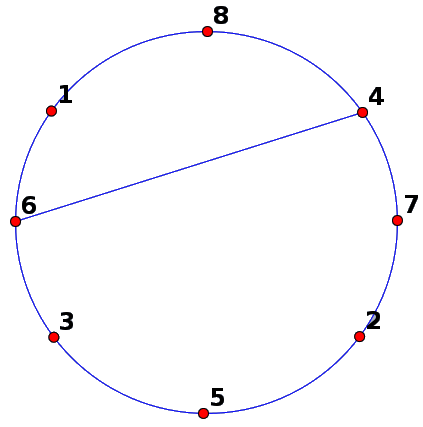I was doing some counting in $S_n$ symmetric group I encountered the following problem, which also someway related to central factorial number. So given a $n$ cycle say $(1,2,\ldots,n)$, what are the monotonic 2 -tuples, of the form $(a,b)(c,d)$, monotonicity in on the 2nd coordinate that is $b<d$ such that. By default transposition $(a,b)$ imply $a<b$.
$$(1,2,\ldots,n)(a,b)(c,d)=\, \text{is still a $n$ cycle } $$ I have succesfully answer the question that is that is having chosen $a,b ,d$, $c\in [a,b)$ that is c can take the value $a$ and all the integer between $a$ and $b$ not $b$.
Let me give you an example say, let's take the 3 cycles $(1,2,3)$ then say you give me $(1,3)(c,3)$ then $ 1\leq c <3$ are the tuples that multiply with $(1,2,3)$ gives back 3 cycle. For this case there are only two other choice $(1,2)(1,3)$ and $(1,2)(1,2)$. This work for all $n$ cycle. Now question start from here. Say I am given an arbitrary $n$ cycle say what would the above classification look like? I still want my cycle to be monotonic in 2 nds coordinate. Let me give some examples to make my problem explicit.
Say I have been given a 4 cycle $(1,4,2,3)$. Now I want to find all the tuples $\{(a,b)(c,d)\mid b\leq d\}$ such that it multiplies to give back the 4 cycles.
To start with we have $( 1,4 )(c,4)$ what should the condition we put on $c$? The cycle $(1,4)(2,4)$ is not answer as it multiply to give a cycle of type $(2,1,1)$.
The natural thing that comes to my mind is there is something to do with the order of the integer. In the first natural cycle, we have the natural order $1 < 2 < 3 < 4$.
For the cycle in example say we attempt to put an order $1<4<2<3 $ these order only for the first coordinates to give conditions for monotonic tuples to give back $n$ cycles. With this order in mind, I can create the following tuples $(2,4)(3,4)$ which when multiplied give back 4 cycles. This also explains why $(1,4)(2,4)$ is not an example as in the above order 2 is greater than 4 hence it's not an answer. Is this can be generalised? Or I am doing something that can be explained nicer more mathematically?

